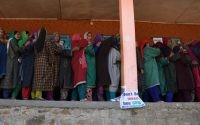$100 Website Offer
Get your personal website + domain for just $100.
Limited Time Offer!
Claim Your Website NowIn jail: Construction worker & leading lawyer
Source: telegraphindia.com
One is a 19-year-old construction worker charged with aiding militants against Indian troops, the other is one of Kashmir’s most prominent lawyers, accused of being “an incorrigible secessionist”.
Despite their different backgrounds, Uzair Maqbool Malik and Nazir Ahmad Ronga have something in common: they are among hundreds of people who have been detained without trial in Kashmir and moved to jails far from home.
The Kashmir Valley has been under lockdown since August 5. Authorities have detained nearly 4,000 people, many of whom have since been released, according to the government.
At least 300 people have been arrested under the Public Safety Act (PSA), which allows for detentions of up to two years without trial, the government said. Most have been sent to jails across Uttar Pradesh.
Sanjay Dhar, the registrar general of the Jammu and Kashmir High Court, said two judges in Srinagar were handling around 300 appeals against PSA detentions filed since August 5.
Malik, 19, grew up in Shopian, a town of around 16,000. As a child, he was friends with two boys who joined a militant group. That childhood association forms the basis of the case against him, according to court documents.
In the documents, Malik is accused of assisting the two militants “in letter and spirit” and giving them “logistic support”. They also say he participated in protests and an operation against security forces, between February 2018 and July 2019.
“You not only yourself indulge in stone pelting but instigate others,” one document said.
Malik’s family denies the charges and says he has not seen the boys who joined the militants since they left. They said he participated in protests in 2016 and was hit in the eye by a metal pellet fired by security forces, partially blinding him. Malik dropped out of school and his family had to sell land to pay for surgery.
“He hasn’t done anything since,” his mother, Haseena Malik, said. “He has made no mistake.”
Dilbag Singh, chief of police for Jammu and Kashmir, said people detained under the PSA had been involved in subversive and terrorist activities, or disturbing public order.
“All required procedural requirements under law are followed while executing detentions under PSA,” he said. Singh said some individuals had been moved due to lack of space in Kashmir’s jails.
For almost two weeks after he was arrested, Malik’s family visited him twice a day. But he was abruptly moved to the central jail in Srinagar, 50km away. When his family went to check on him, they were told he had been moved to a jail in Agra.
Even influential Kashmiris like Ronga, a 67-year-old criminal lawyer who once headed the Jammu and Kashmir High Court Bar Association, have been targeted. He was detained on August 9.
Ronga was detained to help prevent “violence, strikes, economic adversity and social indiscipline” according to court documents.
He was briefly detained at a local police station, before being transferred to Srinagar’s central jail. It took his son Umair Ronga, who is also a lawyer, a week to find him.
In the court documents, dated August 17, Ronga is described by magistrates as “an incorrigible secessionist”. His son denies the charges. His father once represented Mirwaiz Umar Farooq, a separatist, but has no political links with his organisation, the Hurriyat Conference, he said.
But he was involved in pursuing cases related to the region’s status in the Supreme Court, Umair Ronga said. “We were vocal in the Supreme Court of India, not on the roads,” he said. “That is not a crime.”
On September 3, Umair returned to the Srinagar jail and found his father had been moved to a jail in Uttar Pradesh. “He has always advocated the rule of law and the supremacy of the judiciary,” he said. “Now, the same system is being used against him.”



